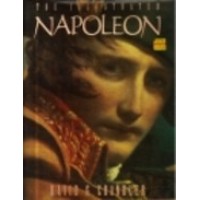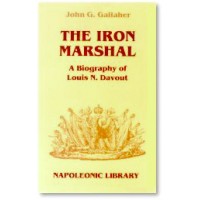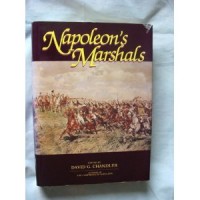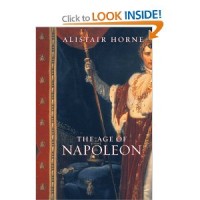I have organized my library by subject matter. As well there is a listing of all the books in my library beginning on this page. Feel free to recommend books and comment on those in my library.
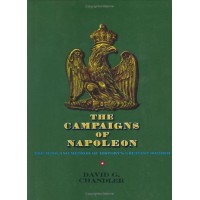
Title: The Campaigns of Napoleon
Author: David Chandler
Published: 1966
The Campaigns of Napoleon is an exhaustive analysis and critique of Napoleon's art of war as he himself developed and perfected it in the major military campaigns of his career.
GMM - I am lucky to have an original 1966 single volume printing of this masterpiece in exceptional condition.
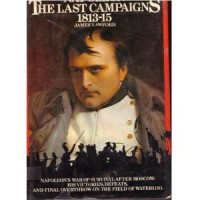
Title: Napoleon: The Last Campaigns 1813-1815
Author: James Lawford
Published: 1979
The book is divided into three parts. Part one depicts the struggle for Germany in 1813 and describes the battles of Bautzen, Dresden, Leipzig, and others. This section also features profiles of the opposing armies and their leaders. Part two describes the Allied invasion of France and the subsequent French campaign. Part three focuses on the Hundred Days, the battle of Waterloo, and the exile and death of Napoleon. Quotations from the battle participants are interspersed throughout the narrative, and there are many illustrations and maps which supplement the text. Finally, the appendix provides an analysis of the battle of Waterloo.
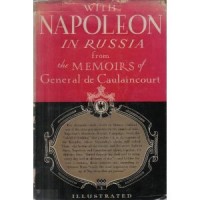
Title: With Napoleon in Russia;: The memoirs of General de Caulaincourt, duke of Vicenza
Author: General de Caulaincourt
Published: 1935
“A volume...whose tremendous importance is due to its complete artlessness and candor....When General de Caulaincourt laid down his pen he had completed, whether he knew it or not, a masterpiece.”–New York Times
GMM - I am lucky to have the original printing from 1935 in my collection.

Title: Imperial Glory: The Bulletins of Napoleon's Grande Armée, 1805-1814
Author: J. David Markham
Published: 2003
Napoleon's bulletins are of immense historical significance, reporting as they do on all the key battles of Napoleon's campaigns. They contain not only important military information, but fascinating political, social and personal commentaries that are critical to understanding Napoleon the man as well as Napoleon the soldier. Presented complete for the first time in English, and supported by Markham's historical and biographical notes, the bulletins cover the key period between the Battle of Austerlitz in 1805 and the collapse of Napoleon's Empire in 1814. The bulletins describe military operations, pick out distinguished officers and units, and present Napoleon's own interpretation of battles lost and won. Also included are various key reports from marshals and others, including the bulletins of the Army of Italy commanded by Massena in 1805. Most of this additional material has never been published in English until now. Imperial Glory is an invaluable contribution to literature on the Napoleonic Wars and a key book for anyone who would like to learn more about one of history's most remarkable and colorful leaders.
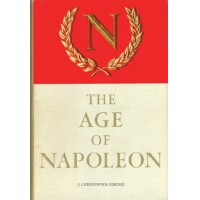
Title: The Age of Napoleon
Author: J. Christopher Herold
Published: 1963
THE AGE OF NAPOLEON is the biography of an enigmatic and legendary personality as well as the portrait of an entire age. J. Christopher Herold tells the fascinating story of the Napoleonic world in all its aspects — political, cultural, military, commercial, and social. Napoleon's rise from common origins to enormous political and military power, as well as his ultimate defeat, influenced our modern age in thousands of ways, from the map of Europe to the metric system, from styles of dress and dictators to new conventions of personal behavior.
GMM - I have the original 1963 printing in my collection.
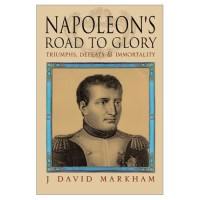
Title: Napoleon’s Road to Glory: Triumphs, Defeats & Immortality
Author: J. David Markham
Published: 2003
This easy read is fast paced, covers all the important facts, and is so well organized that it could be used as a general reference book. It is not a military history-campaigns and battles are covered only briefly. The focus is on how Napoleon came to power; how he ruled; and his long-term, nonmilitary achievements, such as the Code Napoleon, reforming the education system, and rebuilding the French economic infrastructure. The author does not avoid the many controversies that have surrounded the man, nor does he gloss over Napoleon's blunders. One section is devoted to his three major mistakes: the closing of the European markets to Great Britain, the invasion and subsequent quagmire in Spain, and the disastrous 1812 invasion of Russia. Markham also turns a critical eye toward the errors made during the Waterloo campaign. The book ends with a brief look at Napoleon's exile on Saint Helena that addresses his treatment by the British and provides updated information on whether or not he was murdered. The chapters are relatively short and packed with relevant information, and each one provides a superb summary of salient points. Those looking for a quick reference book will be pleased by the logical organization and detailed index, both of which permit readers to find information quickly.

Title: Rites of Peace: The Fall of Napoleon and the Congress of Vienna
Author: Adam Zamoyski
Published: 2007
Following Napoleon's defeat and exile in 1814, the future of the European continent hung in the balance. Eager to negotiate a lasting, workable peace, representatives of Britain, Austria, Prussia, and Russia—along with a host of lesser nations—gathered in Vienna for an eight-month-long political carnival, combining negotiations with balls, tournaments, picnics, artistic performances, and other sundry forms of entertainment for the thousands of assembled aristocrats. While the Congress of Vienna resulted in an unprecedented level of European stability, the price of peace would be shockingly high, with many crucial questions ultimately decided on the battlefield or in squalid roadside cottages amid the vagaries of war.

Title: Waterloo: Battle of Three Armies
Author: Lord Chalfront
Published: 1979
Lord Chalfont leads a team of three historians as each in turn presents an account of the events of June 18, 1815 in the vicinity of the small town of Waterloo - each historian representing on the three principal nationalities present - English, French, German.

Title: The French Exiles
Author: Margery Weiner
Published: 1960
A book about French Exiles in England written from the English perspective.
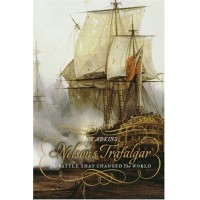
Title: Nelson's Trafalgar: The Battle That Changed the World
Author: Roy Adkins
Published: 2004
In this account of the Battle of Trafalgar, Roy Adkins stunningly evokes the unsurpassed violence of nineteenth-century naval warfare. For more than five hours, sixty ships fought at close quarters as their occupants struggled under the constant barrage of cannon and musket fire, amid choking fumes and ear-splitting explosions. Nelson's navy was severely outgunned; twenty-seven British battleships carrying 2,150 guns faced thirty-three French and Spanish ships carrying 2,640 guns. Yet the British gunners, quicker and more disciplined, carried the day. While the men maneuvered the ships and kept the cannons firing, the women tended the sick and helped the boys carry gunpowder cartridges to the gun decks. When Nelson died in the midst of the battle, French Vice-Admiral Villeneuve remarked that "to any other nation the loss of a Nelson would have been irreparable, but in the British Fleet off Cadiz, every captain was a Nelson."" Adkins has drawn on a broad range of primary source material to write this powerful, unforgettably vivid history that captures as never before the harsh conditions in which sailors lived and died, the mechanics of nautical combat and the human costs of the conflict.
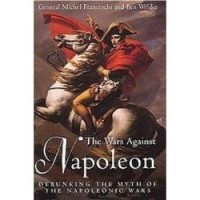
Title: The Wars Against Napoleon: Debunking the Myth of the Napoleonic Wars
Author: General Michel Franceschi & Ben Weider
Published: 2008
Popular and scholarly history presents a one-dimensional image of Napoleon as an inveterate instigator of war who repeatedly sought large-scale military conquests. General Franceschi and Ben Weider dismantle this false conclusion in The Wars Against Napoleon, a brilliantly written and researched study that turns our understanding of the French emperor on its head.
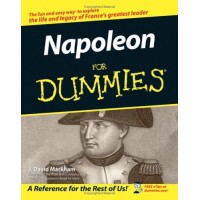
Title: Napoleon for Dummies
Author: J. David Markham
Published: 2005
Napoleon for Dummies is the perfect book for someone who wants to get the lowdown on Napoleon. It combines outstanding scholarship with the easy-reading style associated with the Dummies series, and takes the reader beyond the stereotypes to the real Napoleon.

Title: The Bonapartes
Author: David Stacton
Published: 1966
The 200-year biography of a family, from its obscure origins in Corsica, thorugh its dazzling apotheosis in the person of the Emperor, to its present-day European and American descendants.
GMM - I have the original 1966 printing in my collection.

Title: Moscow 1812: Napoleon's Fatal March
Author: Adam Zamoyski
Published: 2004
Adam Zamoyski’s account of the 1812 campaign is so brilliant that it is impossible to put the book aside. This is not simply because the story is so dramatic. Zamoyski is such an economical and elegant writer that one could overlook the amount of difficult original material he has read in so many languages. His grasp of both the big picture and of the significant detail reveals a master craftsman at work. His prose matches the extraordinary illustrations of military existence by such contemporary war artists as Albrecht Adam.

Title: Madame de Staël
Author: Maria Fairweather
Published: 2005
At one time, it was said that "there are three great powers in Europe: Britain, Russia and Madame de Staël." Outspoken, childish, intelligent, she lived in a tornado of social engagements, political intrigue, literary work, and love affairs. Fairweather's biography rewardingly chronicles her long career, from busy days at the court of Louis XVI through the French Revolution, the Terror, and the rise and fall of the Napoleonic empire. Growing up, she knew Gibbon, Diderot, and D'Alembert, and met Voltaire; later her circle included Talleyrand, Wellington, Goethe, Schiller, and Byron. Her temperament was legendarily volcanic. Talleyrand, hearing that she had professed herself baffled that he could have married his unintellectual wife, commented, "To understand the full value of such peace of mind, one would have to have lived under the same roof as Madame de Staël for a month!"
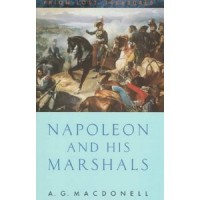
Title: Napoleon and His Marshals
Author: A.G. MacDonell
Published: 1950
At a time when military commanders in Europe were royal princes and dukes, Napoleon's marshals were often the sons of peasants or clerks. And they were usually half the age of their opponents - whom they thrashed soundly with almost monotonous regularity. This is the story of Ney, Murat, Soult, Davout, Bernadotte, Massena, Lannes, Marmont and Augereau. It took, for instance, only 23 days for the entire Prussian army to be defeated and one of the French marshals, Augereau, had the pleasure of taking prisoner the feared Prussian Guards, a regiment he had deserted 20 years earlier in order to become a dancing master. A.G. Macdonell is also the author of "England, their England".

Title: Napoleon and His Marshals (V1 & V2)
Author: J. T. Headley
Published: Originally Published 1847
J(oel) T(yler) Headley (1813-1897), who wrote about a dozen books of an historical nature, was an American author who lived among the generation that was born at the very end of the Napoleonic era. Headley's 2-volume work, Napoleon and His Marshals, was first published in 1846, in the United States.
GMM - I only have the scanned version of this book. :-(

Title: Napoleon's Expedition to Russia: The Memoirs of General de Segur
Author: General de Segur
Published: 2003
A sensation when it was first published in 1821 under the title History of the Expedition to Russia, Undertaken by the Emperor Napoleon in the Year 1812, this chronicle offers an at once heroic and tragic first-hand narrative of the campaign that in a space of six months claimed 1,000,000 lives and set in motion the chain of events that culminated in the fall of France's First Empire." "In the almost two centuries since French General Philippe de Segur's account appeared in Paris, it has provided historians of the Napoleonic era with an unparalleled eyewitness source for graphically detailed and dramatically related material, as it contains some of the most striking and poignant descriptions of war ever written.
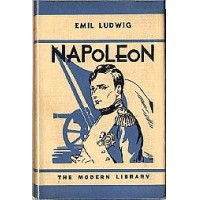
Title: Napoleon
Author: Emil Ludwig
Published: 1953
Ludwig's (1881-1948) classic biography traces in scrupulous detail the man, the society, and the historical events—writing during the very next era, a proximity that affords both clarity in focus and a refreshing lack of twentieth century misinterpretation.
GMM - I have a 1953 reprint of this.
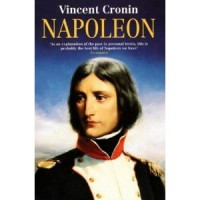
Title: Napoleon
Author: Vincent Cronin
Published: 1976
One of the better biographies written about Napoleon.
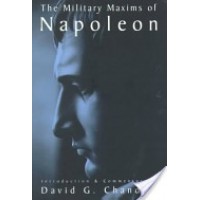
Title: The Military Maxims of Napoleon
Author: David Chandler
Published: 1995
Here, in one volume, is the essence of Napoleon's knowledge and wisdom, the fruit of his practical experience and his study of the great empire-builders from Alexander to Frederick the Great. David G. Chandler has updated the best among previous editions of Napoleon's maxims: the work produced in 1901 by William E. Cairnes, who selected the most insightful and authentic of the maxims and annotated each of them. In the process Cairnes considered the great captains who had influenced Napoleon's thinking as well as the impact of his teachings on the conduct of war since his death. In addition to his penetrating introduction, Chandler has contributed further commentaries that examine Napoleon's work from the 20th-century perspective of the two world wars, Vietnam, the Falklands, and other conflicts, and analyzes the ways in which commanders have observed or failed to observe Napoleon's teachings. Now every military student and enthusiast can benefit from the brilliance of Napoleonic insight and wisdom.

Title: The Origins of the French Revolutionary Wars
Author: TCW Blanning
Published: 1986
A major synthesis of current research on the three wars fought by France during the Revolution - against Austria and Prussia; Britain, Spain and the United Provinces; and against the Second Coalition. contains analysis of the theories of war including Clausewitz, and the role of ideology
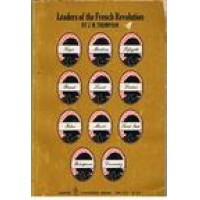
Title: Leaders of TheFrench Revolution
Author: J.M. Thompson
Published: 1967
This volume is a study of 11 of the key figures of the French revolution, providing portraits of the contrasting personalities and fortunes of the men who helped to precipitate and shape one of the most momentous upheavals in history. Of those featured here, only three (Sieyes, Lafayette and Dumouriez) survived the revolution and lived to see its apotheosis in the Napoleonic Empire. Of the others, Mirabeau died in 1791 and Louvet in 1797, while the remainder - Brissot, Marat, Danton, Fabre, Robespierre and St Just - were murdered or executed. J.M.Thompson writes in his introduction "But to all of them the Revolution was an overwhelming experience. What did they do in it? What did they think of it? Let us see." The book contributes to the literature on the revolution and complements the sociological and theoretical work done on the period in recent years.

Title: Fighting Techniques of the Napoleonic Age: Equipment, Combat Skills, and Tactics
Author: Various
Published: 2010
A very useful tool for the reader who's not an expert on Napoleon, but who nonetheless wishes to know something about warfare during the era, at a nuts-and-bolts level. The book is divided into five chapters, covering infantry; cavalry; command and control; artillery, engineers and sieges; and naval warfare. Each of these chapters is lavishly illustrated with pictures, both color plates and black and white drawings. Each chapter includes a discussion of several battles, which illustrate what the text is saying.
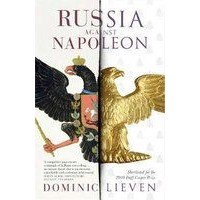
Title: Russia Against Napoleon: The Battle for Europe, 1807 to 1814
Author: Dominic Lieven
Published: 2010
Lieven tells it with all the verve of the enthusiast and the erudition of the fine scholar he is ... The result is a balanced, informed and entirely convincing explanation of how Russia was able to defeat the Napoleonic empire. It is also a perfect marriage of scholarship and engaging narrative that fills a yawning gap in the historiography of the period, while entertaining the reader (Adam Zamoyski, Standpoint )

Title: The Napoleonic wars: An illustrated history, 1792-1815
Author: Michael Glover
Published: 1979
In this book Michael Glover, author of eleven other military historical books, and an authority on the period, weaves together the four strande--military, naval, economic and diplomatic--which went to make p the greatest war that history has known, and which included such classic battles as the Nile, Marengo, Trafalgar, Austerlitz, Jena, Friedland, Wagram, Salamanca, Borodino, Leipzig and Waterloo.

Title: Austerlitz 1805
Author: David Chandler
Published: 1990
Austerlitz was the battle that established Napoleon' reputation: a classic example of the general's masterly use of deception to lure his enemy into a carefully devised trap. Beginning with the bold and crushing advance of the French Army from the Rhine to the Danube, David Chandler describes the envelopment of Mack's army at Ulm, the manoeuvres to Austerlitz and the counter-attack that resulted in the decisive defeat for the Austro-Russian Army. Excellent overview illustrations of the battlefield at Austerlitz supplement the text by clearly showing the movements of the opposing armies. A comprehensive guide to one of the most important battles of the Napoleonic Wars
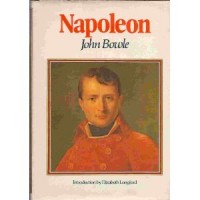
Title: Napoleon
Author: John Bowle
Published: 1975
A well illustrated biography of Napoleon.
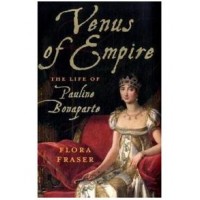
Title: Pauline Bonaparte: Venus of Empire
Author: Flora Fraser
Published: 2009
A force of nature as uncontrolled by her brother Napoleon as the Russian winter, Pauline Bonaparte captivated her peers with her beauty, boundless quest for passion, diamonds and imperiousness. The narrative by British biographer Fraser (Beloved Emma) fleshes out the privileged and politically unstable world of Pauline, who both commissioned and modeled nearly nude for Canova's symbolic marble statue Venus Victorious as a testament to herself.

Title: Wellington at Waterloo
Author: Jac Weller
Published: 1992
Classic account of one of the world's most famous battles. This is a best-selling, authoritative, and accessible study of the epic confrontation at Waterloo. The armies of the period are brought to life and the battles recreated from the viewpoint of both Wellington and Napoleon. Every move and counter-move in this sweeping campaign is charted, from Napoleon's dramatic offensive and the opening battles of Ligny and Quatre Bras, to the hard pounding at Waterloo itself. Valuable to both historian and general reader, this guided tour of the battle includes all the key features of the terrain, and brings out the drama and tragedy of battle. Jac Weller is a distinguished authority on the Duke of Wellington and the author of Wellington in India and Wellington in the Peninsula.

Title: Wellington in the Peninsula, 1808-1814
Author: Jac Weller
Published: 1992
The best single-volume account of the Peninsular War. This classic account of Wellingtons tactics and strategy in the Peninsular War is one of the best single-volume works ever written on the epic campaign.
Jac Weller covers all the battles with the French in which Wellington was involved. Talavera, Busaco, Salamanca and Vittoria are among the famous battles that he brings to life once more, with the aid of meticulous research, extensive visits to and photographs of the battlefields themselves, and an unwavering ability to cut a clear path through tangled military events.
Jac Weller was a distinguished military historian, and an expert on weaponry. Wellington in the Peninsula is part of his famous trilogy on the Duke, together with Wellington in India and Wellington at Waterloo. A collection of his essays, On Wellington, edited by Andrew Uffindell, was recently published by Greenhill.

Title: Men of Waterloo
Author: John Sutherland
Published: 1967
Tells the story of the Hundred Days that followed Napoleon's return from Elba
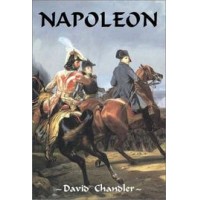
Title: Napoleon
Author: David Chandler
Published: 1973
A biography by one of the leading Napoleon experts.
GMM - I have the original 1973 printing of this book.
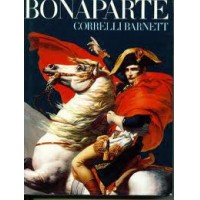
Title: Bonaparte
Author: Correlli Barnett
Published: 1978
Correlli Barnett makes an interesting assessment of Napoleon Bonaparte, seeing him as a politician "on the make," with an unstable power base, rather than a charismatic soldier. In Barnett's view, Bonaparte's campaigns were politically self-serving, carried out to further his own ambition and while his forte was speed and aggression, he was a slapdash and neglectful planner - his armies starved and went barefoot.
GMM - I have the original first printing hardcover from 1978.
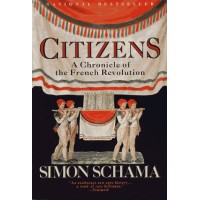
Title: Citizens: A Chronicle of the French Revolution
Author: Simon Schama
Published: 1989
This monumental book attempts to chronicle the French Revolution from its inception to the end of the Reign of Terror in 1794, using a slightly different style than most conventional histories. In the preface, Schama notes that studies of personalities have largely been replaced by studies of grain supplies, indicating a pattern to seek explanations for historical events and trends in obscure economic factors, rather than in the personalities of the leading figures involved.
GMM - I have a first edition printing from 1989.

Title: Marlborough and the War of the Spanish Succession
Author: LT-Col. G. W. L. Nicholson
Published: 1955
Although not strictly a period book, this is one of three collectible books I acquired at a used book shop in Carleton place, Ontario. The other two are specific to the Napoleonic Era.
The Author was Deputy Director, Historical Section of Army Headquarters for the Canadian Forces. It was printed in 1955 by the Directorate of Military Training, Army headquarters, Queen's Printer, Ottawa.
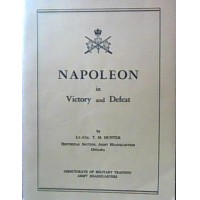
Title: Napoleon in Victory and Defeat
Author: LT.-Col T. M. Hunter
Published: 1964
This is the second of three collectible books I acquired at a used book shop in Carleton place, Ontario.
The Author was in the Historical Section of Army Headquarters for the Canadian Forces. It was printed in 1964 by the Directorate of Military Training, Army headquarters, Queen's Printer, Ottawa.

Title: The British Campaigns in the Peninsula 1808-1814
Author: Captain D.J. Goodspeed
Published: 1958
This is the third of three collectible books I acquired at a used book shop in Carleton place, Ontario.
The Author was in the Historical Section of Army Headquarters for the Canadian Forces. It was printed in 1958 by the Directorate of Military Training, Army headquarters, Queen's Printer, Ottawa.
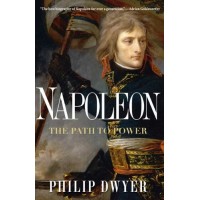
Title: Napoleon: The Path to Power
Author: Philip Dwyer
Published: 2007
Dwyer focuses acutely on Napoleon’s formative years, from his Corsican origins to his French education, from his melancholy youth to his flirtation with radicals of the French Revolution, from his first military campaigns in Italy and Egypt to the political-military coup that brought him to power in 1799.
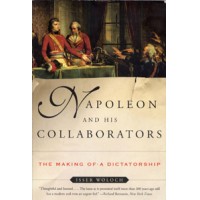
Title: Napoleon and His Collaborators: The Making of a Dictatorship
Author: Isser Woloch
Published: 2002
As its title states, Napoleon and His Collaborators is an attempt to assess the men who made the Napoleonic regime possible. Woloch seeks to explain the success of the Consulate and Empire in attracting a diverse group of Frenchmen to Napoleon's banner. Woloch focuses much of his attention on a few "figures of particular interest": Boulay de la Meurthe, Théophile Berlier, Antione Thibadeau, and Jean-Jacques-Régis Cambacérès.

Title: Dictionary of the Napoleonic Wars
Author: David Chandler
Published:
A reference work on the Napoleonic Wars which covers all the important soldiers, sailors, strategies, armaments and battles that shaped Napoleon's career. Includes information on the campaigns led by Napoleon as well as related events such as the Peninsular War.
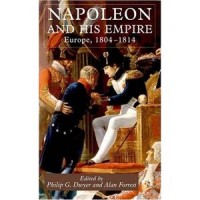
Title: Napoleon and His Empire: Europe, 1804-1814
Author: Philip Dwyer
Published:
Napoleon and His Empire brings together some of the world's leading Napoleonic historians, and is born out of a reflection on the Empire two hundred years after its foundation in May 1804. It provides a timely overview of current trends in research and historiography. It not only revisits traditional themes like Napoleon's revolutionary credentials, the plebiscite for the Empire and the Continental System, but also looks at new research on questions of citizenship, gender, education and local government.

Title: Napoleon 1814: The Defence of France
Author: Andrew Uffindell
Published:
In 1814, after two successive years of defeat in Russia and central Europe, Napoleon was faced with the ultimate disaster - an Allied invasion of France itself. The conduct of the intense, fast-moving campaign that followed has been widely hailed as one of his greatest feats as a commander, yet it has rarely been described fully and objectively. Andrew Uffindell, in this gripping and original study, reconstructs the campaign, reassesses Napoleon's military leadership and provides a masterly account of a campaign that helped shape modern Europe.

Title: FOUCHE
Author: STEFAN ZWEIG
Published:
Hardcover in English (lots of paperbacks around, will be difficult to find a hardcover version in English)

Title: Talleyrand (Profiles in Power)
Author: Philip Dwyer
Published:
There are two books on Talleyrand by Dwyer, either will do, but both would be great! hardcover preferred.

Title: Charles-Maurice de Talleyrand, 1754-1838: A Bibliography
Author: Philip Dwyer
Published:
There are two books on Talleyrand by Dwyer, either will do, but both would be great! hardcover preferred.
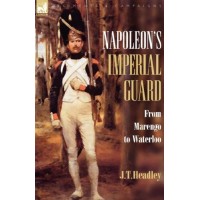
Title: The Imperial Guard of Napoleon: From Marengo to Waterloo (1888)
Author: J. T. Headley
Published: 2007
As with so much of what represented Napoleonic France, the Imperial Guard could trace its existence and spirit back to the Roman Empire of old. Where the Grand Army could look back to affiliate itself with the Legions, the Imperial Guard was nothing less than the Emperor's Praetorians-the elite-the best of the best. Its men coveted their position to the degree that they would often refuse promotion if it meant a transfer to a line regiment. Never squandered, when the Guard advanced it meant the battle was near to its end and victory once more a step away. Their steady presence would put courage into dispirited allied troops and shred the last vestige of morale from an enemy. They represented every branch of the Army and where their magnificent uniforms appeared under their tricolours and eagles, all knew there would also be the Emperor himself. This the story of Napoleon's Imperial Guard from the bearskin caps of the grenadiers to the flamboyance of their mounted chasseurs, their principal characters and the men who commanded them. From Marengo to Waterloo the Imperial Guard created a legend that is unparalleled in modern military history

Title: The Napoleonic Wars: The Rise And Fall Of An Empire
Author: Todd Fisher and Dr Gregory Fremont-Barnes
Published:
Hardcover please.
This omnibus volume in Osprey's relatively new "Essential Histories" combines four previously published entries on the Napoleonic Wars in the series: The Rise of the Emperor, 1805-1807; The Empires Fight Back, 1808-1812; The Peninsular War, 1807-1814; The Fall of the French Empire, 1813-1815.

Title: Napoleon's Commanders
Author: Philip Haythornthwaite
Published:
There are two volumes in this series (1) and (2). As always, hardcovers are preferred, even in gently used.

Title: A Desperate Business: Wellington, the British Army and the Waterloo Campaign
Author: Ian Fletcher
Published:
Hardcover please.

Title: Napoleons Exile
Author: Patrick Rambaud
Published: 2003
The stunning finale to the award-winning Napoleonic trilogy presents the legendary figure as you have never before seen him — exiled and humiliated and vividly real. Patrick Rambaud closes his epic trilogy, which began with The Battle, winner of the Prix Goncourt and the Grand Prix Roman de l’Academie Francaise, and The Retreat. In 1814 Napoleon is racing back to Paris from the debacle of his Russian invasion. A plot afoot in the capital — to return a royal to the throne — succeeds, and Napoleon’s marshals force him to abdicate and go into exile. Octave Senecal, Napoleon’s loyal aide and savior, tells the tale of their journey south through the angry, mob-filled countryside to Elba, a tiny island off the coast of Tuscany. Here Patrick Rambaud brings to life not the Napoleon of the history books, but Napoleon the man — a man horribly bored by exile, gambling with his mother to pass the time, spearing the occasional tuna with local fishermen, and fretting constantly that secret agents and murderers surround him. He is soon planning his escape, while in France his former soldiers spend their evenings drinking to the return of “l’absent.” They won’t have long to wait.

Title: The Retreat
Author: Patrick Rambaud
Published:
A gripping historical novel focused on Napoleon's dramatic invasion of Russia, The Retreat is a stirring follow-up to The Battle, winner of France's Goncourt Prize. The Retreat opens in September 1812, with the French army at the gates of Moscow. Exhausted, famished, and demoralized, they are only a quarter of the 400,000-strong force that crossed the river Niemen three months before. But the sight of this famous city feels like a triumph and a chance, at last, to enjoy a conqueror's spoils. Moscow, however, has been evacuated, and all its supplies removed. Suddenly fires break out, and the burning city becomes a trap. And yet the French stay to pursue their disparate aims amid an air of complete unreality. Henri Beyle -- better known as Stendhal -- goes about his duties as a functionary while thinking of Nero. The soldiers fill their pockets with diamonds but still don't have enough money to buy bread. And all the while, oblivious to their predicament, Napoleon sends to Paris for comic novels and imagines that it is only a matter of time before Tsar Alexander sues for peace. Finally, a month later, the Grande Armee retraces its steps toward the Berezina. Harassed by Cossacks decimated by fighting, the cold, and starvation, the French endure their most brutal test. With the same extraordinary gift for evocation and dramatic power he showed in The Battle, Rambaud brings this disastrous campaign to a brilliant, near-hallucinatory life.
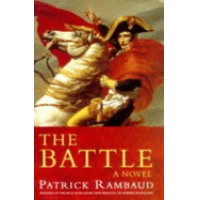
Title: The Battle
Author: Patrick Rambaud
Published:
In 1831, French novelist Balzac began taking notes for a novel of the Battle of Essling (1809), Napoleon's first defeat on the Continent. The narrative would include "not a single woman: only cannon, horses, two armies, uniforms," with Napoleon appearing at a distance, crossing the Danube at the end of the day. Balzac never finished the book, but Rambaud has amply realized his ambition in The Battle, which won the Prix Goncourt and the Grand Prix Roman de l'Acad?mie Fran?aise. Napoleon dominates Rambaud's account: "he detested familiarity and advice: all he desired of his officers, like his courtesans, was mute obedience." Wherever the emperor goes, his household goods go, too: a mountain of linens, china and food, his iron bedstead, carpet, chandeliers, and a round of parmesan cheese to sprinkle on his soup. Future novelist Stendhal is also present as witness to the devastation of this "battle without a victor." Rambaud balances horrific battle set pieces and subtle characterizations to produce what will be a classic
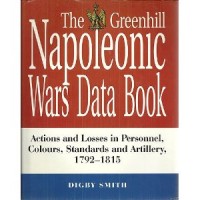
Title: The Greenhill Napoleonic Wars Data Book
Author: Digby Smith
Published: 1998
A comprehensive data collection of the details associated with each of the battles. A truly exhaustive book of data.

Title: Vienna, 1814: How the Conquerors of Napoleon Made Love, War, and Peace at the Congress of Vienna
Author: David King
Published: 2008
Leaders from the world's five major diplomatic forces—Great Britain, France, Austria, Prussia and Russia—convened in Vienna in 1814 to found a new order for post-Napoleonic Europe. Historian King (Finding Atlantis) calls it the greatest and most lavish party in history, at which delegates would plot, scheme, jockey for position, and, in short, infuriate each other as they competed in affairs of state and the heart. King covers the diplomatic wrangling well, particularly over the fates of Poland, Saxony and the Kingdom of Naples. His greater strength is in depicting the personalities and motivations of the key players, such as Metternich's daring love affair with a baroness and Czar Alexander I's growing reliance on a German mystic. Despite endless parties, the Congress achieved pioneering work in culture and human rights, including Jewish rights and a vote to abolish slavery. Most important, it established alliances that defeated Napoleon's attempt to regain power in 1815 and helped foster a spirit of cooperation that, in some ways, has still not been surpassed. King's fine work is not quite as scholarly as the book it recalls, Margaret Macmillan's Paris 1919, but it is more deftly paced and engagingly written.
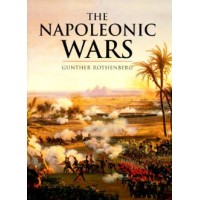
Title: The Napoleonic Wars
Author: Gunther Rothenberg
Published: 2000
Military historian Gunther Rothenberg provides a detailed account of the Napoleonic Wars in this installment of Cassell's multivolume series covering the history of warfare. The treatment is predominantly military rather than social. The matter-of-fact, dispassionate text is rich in tactical details and statistics, augmented by contemporary paintings, well-designed maps, and diagrams. The actions of the protagonists' commanders are also critically assessed, with much attention given to Napoleon himself, stressing the power of his charisma but showing that his insistence on sole control ultimately proved a weakness. Significantly, The Napoleonic Wars aims to show that, far from being the end of a military era, this was a period marking the origins of modern warfare. Developments in army organization, strategy, and weaponry gained from the experience of over 20 years of war are progressively described. The main points of Rothenberg's argument, that Napoleonic strategies continued to be followed and that the sheer scale of war was revolutionary, are summed up in the brief epilogue. The bulk of the broadly chronological text is uncluttered by too much speculation; military-history buffs will appreciate The Napoleonic Wars for its clarity.
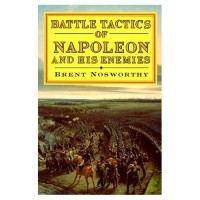
Title: Battle Tactics of Napoleon and His Enemies
Author: Brent Nosworthy
Published: 1998
In this book, Brent Nosworthy provides a wealth of detailed analysis of the various tactical doctrines employed by the main armies of the Revolutionary and Napoleonic period.

Title: Paris Between Empires, 1814-1852
Author: Philip Mansel
Published: 2001
Between 1814 and 1852 Paris was a city of power and pleasure, a magnet for people of all nationalities that exerted an influence far beyond the borders of France. Paris was the stage where the great conflicts of the age, between nationalism and cosmopolitanism, revolution and royalism, socialism and capitalism, atheism and Catholicism, were fought out before the audience of Europe. As a contemporary proverb put it: when Paris sneezes, Europe catches cold. PARIS BETWEEN EMPIRES tells the story of this golden age, from the entry of the allies into Paris on 31 March 1814, after the defeat of Napoleon I, to the proclamation of another Bonaparte, his nephew Louis-Napoleon, as Napoleon III in the Hotel de Ville on 2 December 1852. During those years, Paris, the seat of a new parliamentary government, was a truly cosmopolitan capital, home to Rossini, Heine and Princess Lieven, as well as Berlioz, Chateaubriand and Madame Recamier.
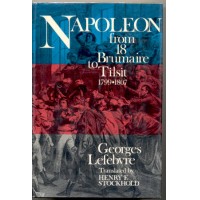
Title: Napoleon: From 18 Brumaire to Tilsit, 1799- 1807
Author: Georges Lefebvre
Published: 1969
Lefebvre’s history sweeps us from the lightning coup d’état of 18 Brumaire in 1799 to his final downfall amidst the wheatfields of Waterloo. More than a biography, it is a brilliant survey of the turbulent age Napoleon inaugurated in his attempt to redraw the map of Europe, from the Peninsular War to the invasion of Russia. The cast includes his antagonists – Pitt the Younger, Wellington, Metternich and Tsar Alexander – and his allies – the wily Minister of Police Fouché and Talleyrand, the ‘Prince of Diplomats’. Lefebvre’s account is equally clear-eyed about Napoleon’s genius and his flaws. Napoleon’s determination to emulate Caesar and Augustus condemned Europe to more than a decade of war and economic crisis, but he also built an empire, introducing educational, administrative and financial initiatives that are still in place today.
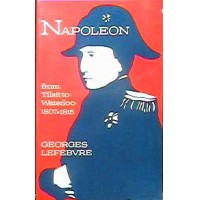
Title: Napoleon: From Tilsit To Waterloo 1807 - 1815
Author: Georges Lefebvre
Published: 1969
Considered a classic study of the Napoleonic era, this two-volume set presents the history of a time that was dominated by Napoleon Bonaparte. The author looks at the intricate political and intellectual trends of the age, focusing on economic and social developments as well as individuals who shaped the course of events. In particular, he examines the collective life of the French people.
"In the huge canon of Napoleonic historiography [this book] occupies a commanding height. No one with a serious interest in the Napoleonic era can afford to ignore it." (London Times)

Title: Domination: Some Napoleonic Episodes
Author: Marjorie Johnston
Published: 1930
Marjorie Johnston, in Domination: Some Napoleonic Episodes (1930), speaking of the Napoleonic Era, said it was only possible while Napoleon "remained capable of dominating it, as a god dominates his creation...It was a thing so hurriedly and imperfectly conceived that it failed to justify its existence in time to save itself from destruction, but as a creation it had in it some very splendid elements." Johnston believed that 1803 was the beginning of the end for Napoleon saying it was the first time revolutionary France had deliberately sought a pretext for war.
I have the original 1930 edition hardcover.

Title: 1809 THUNDER ON THE DANUBE: Napoleon's Defeat of the Habsburgs Volume I: Abensberg
Author: John H. Gill
Published: 2008
The Franco-Austrian War of 1809 was Napoleon's last victorious war. Napoleon faced the Archduke Charles, the best of the Habsburg commanders, and a reformed Austrian Army that was arguably the best ever fielded by the Danubian Monarchy. The French ultimately triumphed but the margin of superiority was decreasing and all of Napoleon's skill and determination was required to achieve a victorious outcome.Gill tackles the political background to the war, especially the motivations that prompted Austria to launch an offensive against France while Napoleon and many of his veterans were distracted in Spain. Though surprised by the timing of the Austrian attack on April 10th, the French Emperor completely reversed a dire strategic situation with stunning blows that he called his 'most brilliant and most skillful maneuvers'. Following a breathless pursuit down the Danube valley, Napoleon occupied the palaces of the Habsburgs for the second time in four years. The Austrians recovered, however, and Napoleon suffered his first unequivocal repulse at the Battle of Aspern-Essling on the shores of the Danube opposite Vienna.He would win many battles in his future campaigns, but never again would one of Europe's great powers lie broken at his feet. In this respect 1809 represents a high point of the First Empire as well as a watershed, for Napoleon's armies were declining in quality and he was beginning to display the corrosive flaws that contributed to his downfall five years later.

Title: 1809 THUNDER ON THE DANUBE: Napoleon's Defeat of the Habsburgs, Vol. II: The Fall of Vienna and the Battle of Aspern
Author: John H. Gill
Published: 2008
In the second volume of this epic work, John H. Gill traces Napoleon's progress as he sought to complete his victory over the Habsburgs. The war had erupted on April 10th with Austria's invasion of Germany and Italy. After just two weeks, Napoleon had battered the Habsburg Archduke Charles in a series of bruising defeats.
This volume begins with a Napoleon astride the Danube at Regensburg. He faced a critical strategic choice - whether to pursue the injured Austrian main army into Bohemia or march directly for Vienna, the seat of Habsburg power.
After electing to target Vienna, his troops defeated the Austrians in the brutal Battle of Ebelsberg, allowing him to enter the city on May 13th. But meanwhile, on the far side of the Danube, he suffered a dramatic loss at the grueling, two-day Battle of Aspern. While his Danube forces recovered from this setback, the Emperor cleared trouble from his strategic flanks.
Gill describes in vivid detail the hopeful Habsburg invasion of Italy, led by the 27-year-old Archduke Johann, and the fierce French counter-offensive under Napoleon's stepson, Eugene de Beauharnais (also 27). In a series of encounters across Italy, Eugene rebounded from initial defeat to advance triumphantly into Austrian territory, shattering and scattering Johann's army. In the wake of Aspern, while the Austrians vacillated, Napoleon gathered every man, horse and gun around Vienna, setting the stage for the gigantic spectacle of the Battle of Wagram, the final chapter in the story of the 1809 war.

Title: 1809 THUNDER ON THE DANUBE: Napoleon's Defeat of the Habsburgs, Vol. III: The Final Clashes of Wagram and Znaim
Author: John H. Gill
Published: 2010
In this third volume John H. Gill brings to a close his magisterial study of the 1809 war between Napoleonic France and Habsburg Austria. This final volume begins with the principal armies of both antagonists recuperating on the Danube's banks. As they prepared for the next encounter, important actions were taking place in distant theaters of war: Eugene brought his army into Hungary and won a crucial victory over Johann on the anniversary of Marengo, Prince Poniatowski's Poles outflanked another Austrian archduke along the Vistula, and future marshal Marmont drove an Austrian force out of Dalmatia to join Napoleon at Vienna.These subsidiary campaigns all set the stage for the clash that would decide the war: the titanic Battle of Wagram. Second only in scale to the three-day slaughter at Leipzig in 1813, Wagram saw more than 320,000 men and 900 guns locked in two days of fury that ended with Austrian retreat. The defeat, however, was not entirely complete and Napoleon had to force yet another major engagement on the Austrians before Charles would accept a ceasefire. This under-appreciated battle at Znaim introduced an extended armistice that finally ended with a peace treaty signed in Vienna in October.Gill makes use of an impressive array of sources to present a lively account that covers the conflict from the diplomacy of emperors to the common soldiers suffering the privations of campaigning and the horrors of battle as they attempt to carry out their duties. Enriched with uncommon illustrations, more than 40 specially prepared maps, and extraordinary order of battle detail, this work concludes an unprecedented English language study of Napoleon's last victorious war

Title: The Battle of the Berezina: Napoleon's Great Escape
Author: Alexander Mikaberidze
Published: 2010
In the winter of 1812, Napoleon's army retreated from Moscow under appalling conditions, hunted by three separate Russian armies, its chances of survival apparently nil. By late November Napoleon had reached the banks of the River Berezina - the last natural obstacle between his army and the safety of the Polish frontier. But instead of finding the river frozen solid enough to march his men across, an unseasonable thaw had turned the Berezina into an icy torrent. Having already ordered the burning of his bridging equipment, Napoleon's predicament was serious enough: but with the army of Admiral Chichagov holding the opposite bank, and those of Kutusov and Wittgenstein closing fast, it was critical. Only a miracle could save him ...
In a gripping narrative Alexander Mikaberidze describes how Napoleon rose from the pit of despair to the peak of his powers in order to achieve that miracle. Drawing on contemporary sources - letters, diaries, memoirs - he recreates one of the greatest escapes in military history - a story often half-told in general histories of the Russian campaign but never before fully explored

Title: The Fall of Napoleon: Volume 1, The Allied Invasion of France, 1813-1814
Author: Michael V. Leggiere
Published: 2007
This book tells the story of the invasion of France at the twilight of Napoleon's empire. With over a million men under arms throughout central Europe, Coalition forces poured over the Rhine River to invade France between late November 1813 and early January 1814. Three principle army groups drove across the great German landmark, smashing the exhausted French forces that attempted to defend the eastern frontier. In less than a month, French forces ingloriously retreated from the Rhine to the Marne; Allied forces were within one week of reaching Paris. This book provides the first complete, English-language study of the invasion of France along a front that extended from Holland to Switzerland.
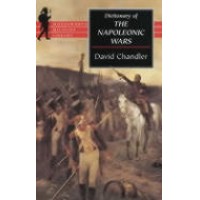
Title: Dictionary of the Napoleonic Wars
Author: David Chandler
Published: 1979
A reference work on the Napoleonic Wars which covers all the important soldiers, sailors, strategies, armaments and battles that shaped Napoleon's career. Includes information on the campaigns led by Napoleon as well as related events such as the Peninsular War.
I have the original 1979 printing.

Title: FROM EYLAU TO FRIEDLAND: 1807 The Polish Campaign
Author: F.-G. Hourtoulle
Published: 2007
For More than 40 years, F.-G. Hourtoulle has explored the Napoleonic epic and for the past eight years, he has been producing fabulous books for enthusiasts, packed with color graphics and contemporary paintings.Continuing on from Jena Auestaedt , Borodino, Wagram, and 1814 comes this latest volume on Friedland. From Berlin to Tilsit, Napoleon led the French army in one of his most glorious campaigns. During these eight months, the basic rank-and-file as well as the most legendary general out all their efforts in to the task of reviving Friedland, the best army in Europe was the tool of one of the greatest military leaders of all time.

Title: JENA AUERSTAEDT: The Triumph of the Eagle
Author: F.-G. Hourtoulle
Published: 2005
The First Empire was at its height during the Jena-Auerstadt campaign of 1806. The campaign was a classic of Napoleonic tactics, as Marshal Davout held one German army at bay while Napoleon concentrated his forces to defeat the main one. This excellent book combines an informative narrative with paintings of the battles and a superb collection of images of uniforms and equipment from the period-all in color.
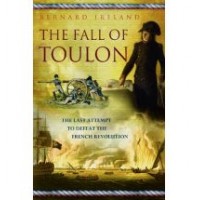
Title: The Fall of Toulon
Author: Bernard Ireland
Published: 2005
The British-led attempt to overthrow the French revolution is a cautionary tale for all attempts at 'regime change'. In the summer of 1793 the surviving French Royalists surrendered the great naval base at Toulon to the British, intending this to be the springboard for a full-scale counter-revolution. A multi-national taskforce led by the British, but including Spanish, Austrian and Italian forces landed in the city. But the Royalists' hopes were dashed: the revolutionaries reacted with great speed and violence. Instead of striking into France the Royalists and their foreign allies are besieged in Toulon. Among the republican forces is a young artillery officer who soon makes a name for himself: Napoleon Bonaparte. The Allied forces botch their withdrawal, a chaotic flight that made the last days of Saigon look orderly. Only a fraction of the Royalists escape with the ships, thousands are massacred in the fall of the city or face the guillotine afterwards. Bernard Ireland's popular and accessible account of the fall of Toulon brings to life a savage episode in European history.
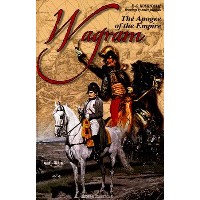
Title: Wagram - The Apogee of the Empire
Author: F.G. Hourtoulle
Published: 2003
In the same style as the previous two books by Hourtoulle, here is a fabulous full color book on this major battle in the Napoleonic Wars. A detailed text is accompanied by contemporary paintings and a vast array of graphics illustrating the uniforms and equipment of the soldiers of the time.

Title: Austerlitz - The Empire at its Zenith
Author: F.G. Hourtoulle
Published: 2003
The fourth book in an excellent series from Histoire and Collections, Austerlitz covers the faous battle, the results of which saw Napoleon at the height of his power. A detailed text is accompanied by contemporary paintings and a vast array of graphics illustrating the uniforms and equipment of the soldiers of the time.
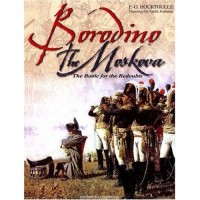
Title: Borodino The Moskova - The Battle for the Redoubts
Author: F.G. Hourtoulle
Published: 2003
Readers of F.-G. Hourtouille's acclaimed Jena-Auerstaedt will find the same extraordinary detail in this study of Napoleon's 1812 campaign. Over 300 uniforms and over 120 flags are featured in the color plates as well as paintings of the battle. The evolution of the battle is described with the aid of numerous new color maps.

Title: Josephine - A Life of the Empress
Author: Carolly Erickson
Published: 1998
When she married Napoleon Bonaparte in 1796, Rose de Beauharnais was a 32-year-old widow who had narrowly escaped the French Revolution's guillotine. She was six years older than he, notorious for her lovers, and unlikely to give him children, but possessed of the social connections and skills the ambitious young general thought would help him rise in the revolutionary army. He gave "his living reverie, his dream of perfect passion" a new name, Josephine--perhaps hoping it would blot out her unsavory past. Instead, she continued to be promiscuous as well as extravagant, and the marriage soured as Napoleon ascended to first consul and then emperor of the French. Yet he divorced her only in 1810, when political events made it clear he must have an heir. This highly colored biography practically wallows in Josephine's lurid personal life, colored in by luscious descriptions of the period's clothes, food, and amusements. The author, whose many previous books mostly deal with English royalty, does not burden readers with excessive doses of French history; the focus is always on Josephine, whose psychology is discussed at length. Erickson succeeds in making her subject an attractive figure, if hardly an exemplar of moral rectitude. Her book should appeal to those who like their historical biographies titillating and not too taxing.
